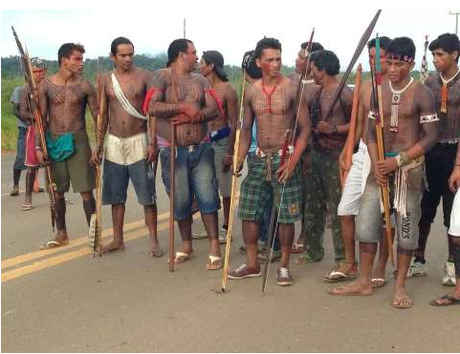by Xingu Vivo / The Ecologist
A delegation of Xikrin Indigenous People were attacked this week with blast grenades and rubber bullets when they tried to enter the Belo Monte construction site to talk with representatives of Norte Energia S.A., responsible for the project. Four of them were wounded.
Approximately 20 indigenous representatives walked to the site – peacefully and unarmed – to call for the fulfillment of the indigenous conditions that are stipulated in the Basic Environmental Plan (BPA) that forms part of the construction contract, but has never been implemented.
On arriving at the site, according to their account, the Indians were received with surprise by police – members of Brazil’s National Public Security Force – who immediately fired rubber bullets and stun grenades at them.
‘They just carried on firing at us’
“We announced that we were there to talk, we attempted to talk”, according to the Xikrin.” The police did not ask us anything. They just said they did not want to talk – and carried on firing at us.”
Faced with this, they returned to Altamira, where they reported the incident to the Federal Public Ministry (MPF – Ministério Público Federal).
The commander of the National Force in Altamira will be heard by the MPF. The Attorney General will be receiving a formal solicitation to requisition, from the Minister of Justice, information about the limits, objectives and justifications for the presence of the National Force at the Belo Monte hydroelectric plant construction sites.
The MPF requested that the National Indian Foundation (FUNAI) present the victims for forensic examination.
Not the first complaint – but this time, it’s criminal
This is not the first complaint filed regarding alleged abuses of the men in the National Force within the Belo Monte construction sites.
The MPF has already received reports from workers and has formal proceedings underway to investigate “the legitimacy of the action of the National Force in defense of the property of Norte Energia, S.A. and the Belo Monte Construction Consortium”.
With today’s attacks against the Indians, the MPF’s investigation is now criminal in nature.
Five days before, indigenous persons of various ethnicities affected by Belo Monte – Parakanã, Assurini, Xipaya, Curuaia, Arara Arara da Cachoeira Seca and Orangery – began a blockade of the Trans-Amazon Highway to prevent the entry of workers to the hydroelectric construction site.
Over three years on, promises still not fulfilled
Their aim was to force the company to implement the Basic Environmental Plan (BPA). It was expected to be signed 35 days after the installation license was granted in January 2011 – but now the site is sealed, construction is half complete, and still, say the Indians, Norte Energia has failed to sign the document.
“One of the goals of the occupation was that Norte Energia should sign the term sheet – the company says it has signed it, but it has not yet told us anything about it”, said Ney Xipaya, one of the leaders on site.
The PBA sets out the duties of Norte Energia to compensate indigenous communities for the damage caused by Belo Monte power plant over 35 years, beginning in 2010. But the Indians have already suffered severe impacts but received no benefit.
Now they want Norte Energia to expedite the promises it made, for example, to building schools, houses and lanes for transporting health workers. “No more leaving us only promises, and nothing on paper, because we know that with Norte Energia does not work”, said Ney Xipaya.
Trying to escape commitments on health and education
The reason for the delay in signing the BPA, according to the Indians, is the company’s attempts to evade the commitments it contains to education and health.
At a meeting in February 2014, Norte Energia said it would not assume the construction of schools and health posts, claiming that the works are duties of the Ministry of Education and Indigenous Health – even though these are clearly written into the PBA.
A letter sent last weekk to FUNAI demanded the presence of the president of the Foundation, Maria Augusta Assirati. “For now we are in a peaceful demonstration”, the letter stated.
“We are letting the cars go and just blocking the entry of company vehicles, but if we do not have a position, we can not guarantee anything.”
Last Saturday morning, a bus from Belo Monte Construction Consortium was found burned out the previous night. The National Security Force are still investigating.
On Saturday morning, a lawyer Norte Energia and a bailiff arrived at the the blockade e to deliver a subpoena to the Indians allow the CCBM coaches to pass, but no agreement was reached. According to the Indians, if their demands are not met, further buses may be burned.
No compensation – and FUNAI nowhere to be seen
There has not been a single project covering compensation for or mitigation of the impacts from Belo Monte.
Furthermore, neither FUNAI nor the Brazilian Institute of the Environment (IBAMA) has ever visited the village to assess compliance with the conditions of the construction contract.
Xingu Vivo - the Xingu Forever Alive Movement (MXVPS) is a collective of organizations and social movements and environmentalists of the Altamira region and areas of influence of the Belo Monte dam project in Pará, that historically opposed its installation on the Xingu River. Besides counting on the support of local, state, national and international organizations, the MXVPS aggregates organizations representing coastal fishermen, rural workers, indigenous inhabitants of Altamira, by dams, women’s movements and religious and ecumenical organizations.
This article is combines two articles originally published in Portuguese at xinguvivo.org.br/.

